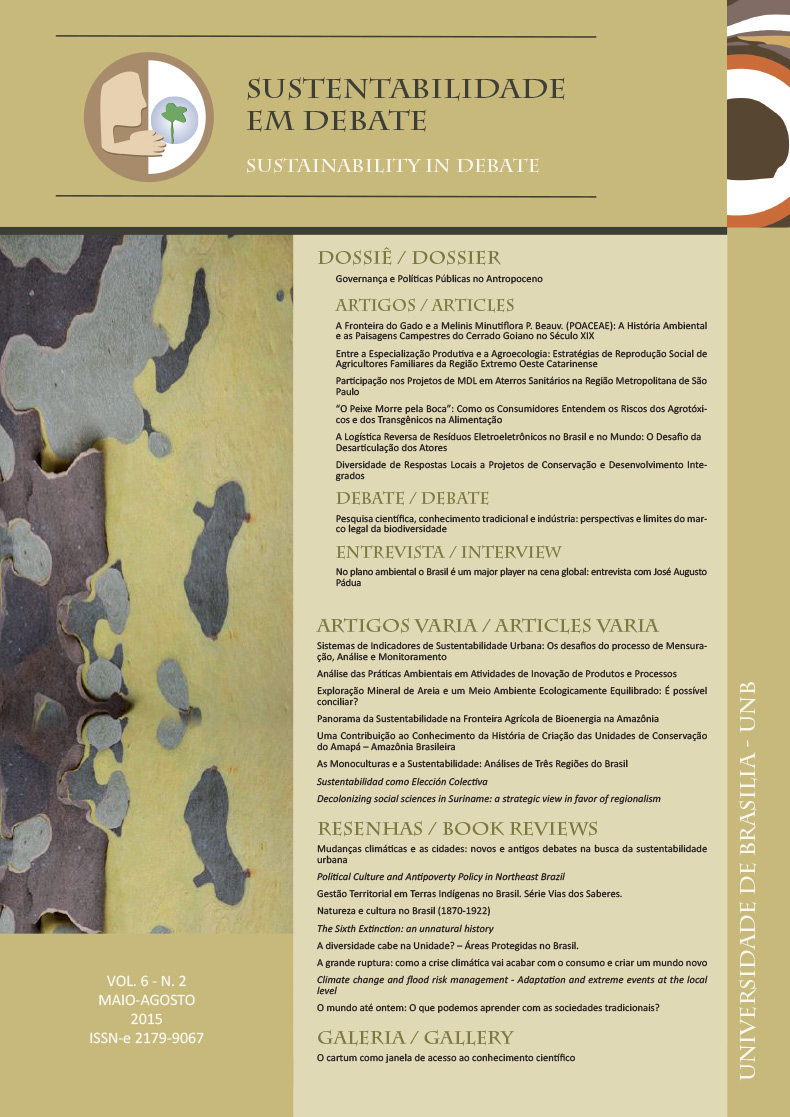Sustentabilidad como Elección Colectiva
DOI :
https://doi.org/10.18472/SustDeb.v6n2.2015.14698Mots-clés :
Sustentabilidad, Elección ColectivaRésumé
En este artículo se enfatiza que la sustentabilidad es un asunto de elección colectiva. No existe una definición definitiva de lo que significa ni un procedimiento estándar para alcanzarla. La sustentabilidad siempre será ambigua, y podrá redefinirse en cada contexto donde sea aplicada. Esta característica de la sustentabilidad la torna un asunto de elección colectiva, donde los resultados dependerán de la habilidad de la sociedad para resolver asuntos comunes. Por ello, la sustentabilidad estará asociada a espacios de deliberación donde estarán en juego intereses y valores, pero el éxito estará en la medida que tales espacios traten las causas de los problemas y no simplemente equilibrar los intereses en disputa.
Téléchargements
Références
Zedbook, 2013.
AGYEMAN, Julian; EVANS, Bob. “Just Sustainability”: The emerging discourse of environmental
justice in Britain? The Geographical Journal, v. 170, n. 2, p. 155-164, 2004.
ANAND, Sudhir; SEN, Amartya. Human Development and Economic Sustainability. World Development
, v. 28, n. 12, p. 2029-2049, 2000.
ARIAS, Fabio. Instituições e sustentabilidade no ordenamento territorial de três municípios do
Valle del Cauca, Colômbia. Brasilia: UnB, 2012.
DALY, Herman. From Uneconomic Growth to Steade-State Economy. Northampton: Edward Elgar,
2015.
DIAMOND, Jared. Colapso. Por qué unas sociedades perduran y otras desaparecen. Bogotá:
Debolsillo, 2007.
EVANS, Peter. A la búsqueda de agentes para la habitabilidad urbana en una economía política
globalizada. En EVANS, P. Instituciones y desarrollo en la era de la globalización neoliberal. Bogotá:
ILSA, 2007.
GEORGESCU-ROEGEN, Nicholas. Energy and Economic Myths. Southern Economic Journal, V.
41, N. 3, p. 347-381, 1975.
GEORGESCU-ROEGEN, Nicholas. Entropy Law and the Economic Process. Cambridge, Harvard
University Press, 1971.
HARDIN, Garrett. The Tragedy of the Commons. Science, v. 162, p. 1243-1248, 1968
JACKSON, Tim. Prosperidad sin crecimiento: Economía para un planeta finito. Barcelona: Encuentro
Icaria-Internón Oxfam, 2011.
KATES, R.; PARRIS, T.; LEISEROWITZ, A. What is sustainable development? Goals, Indicators,
Values and Practice. Environment. v. 47, n. 3, p. 8-21, 2005.
OLSON, Mancur. A lógica da ação coletiva: os beneficios públicos e uma teoria dos grupos sociais.
São Paulo: Editora da Universidade de São Paulo, 1999.
OSTROM, Elinor. Governing the commons: the evolution of institutions for collective action.
New York: Cambridge University Press, 1990.
RATNER, Blake. “Sustainability” as a dialogue of values: Challenges to the sociology of development.
Sociological Inquiry , v. 74, n. 1, p. 50-69, 2004.
SACHS, Ignacy. Caminhos para o Desenvolvimento Sustentável. Rio de Janeiro: Garamond, 2002.
SACHS, Ignacy. Estratégias de transição para o século XXI: desenvolvimento e meio ambiente.
São Paulo: FUNDAP, 1993.
SEN, Amartya. Desarrollo y libertad. Bogotá: Planeta, 2000.
SOLOW, Robert M. An almost practical step toward sustainability. Resources Policy, v. 19, p. 162-
172, 1993.
SWYNGEDOUW, Erik. Impossible sustainability and the post-political condition. En KRUEGER, R.;
GIBBS, D. The sustainable development paradox . Urban political economy in the United States
and Europe, p. 13-40. New York: Guildford, 2007.
SWYNGEDOUW, Erik. ¡La naturaleza no existe! La sostenibilidad como síntoma de una planificación
despolitizada. URBAN, p. 41-66, 2011.
Téléchargements
Publié-e
Comment citer
Numéro
Rubrique
Licence
SUSTAINABILITY IN DEBATE – Copyright Statement
The submission of original scientific work(s) by the authors, as the copyright holders of the text(s) sent to the journal, under the terms of Law 9.610/98, implies in the concession of copyrights of printed and/or digital publication to the Sustainability in Debate Journal of the article(s) approved for publication purposes, in a single issue of the journal. Furthermore, approved scientific work(s) will be released without any charge, or any kind of copyright reimbursement, through the journal’s website, for reading, printing and/or downloading of the text file, from the date of acceptance for publication purposes. Therefore, the authors, when submitting the article (s) to the journal, and gratuitous assignment of copyrights related to the submitted scientific work, are fully aware that they will not be remunerated for the publication of the article(s) in the journal.
The Sustainability in Debate Journal is licensed under Creative Commons License – Non-Commercial-No-Derivation Attribution (Derivative Work Ban) 3.0 Brazil, aiming at dissemination of scientific knowledge, as indicated on the journal's website, which allows the text to be shared, and be recognized in regards to its authorship and original publication in this journal.
Authors are allowed to sign additional contracts separately, for non-exclusive distribution of the works published in the Sustainability in Debate Journal (for example, in a book chapter), provided that it is expressed the texts were originally published in this journal. Authors are allowed and encouraged to publish and distribute their text online, following publication in Sustainability in Debate (e.g. in institutional repositories or their personal pages). The authors expressly agree to the terms of this Copyright Statement, which will be applied following the submission and publishing by this journal.






